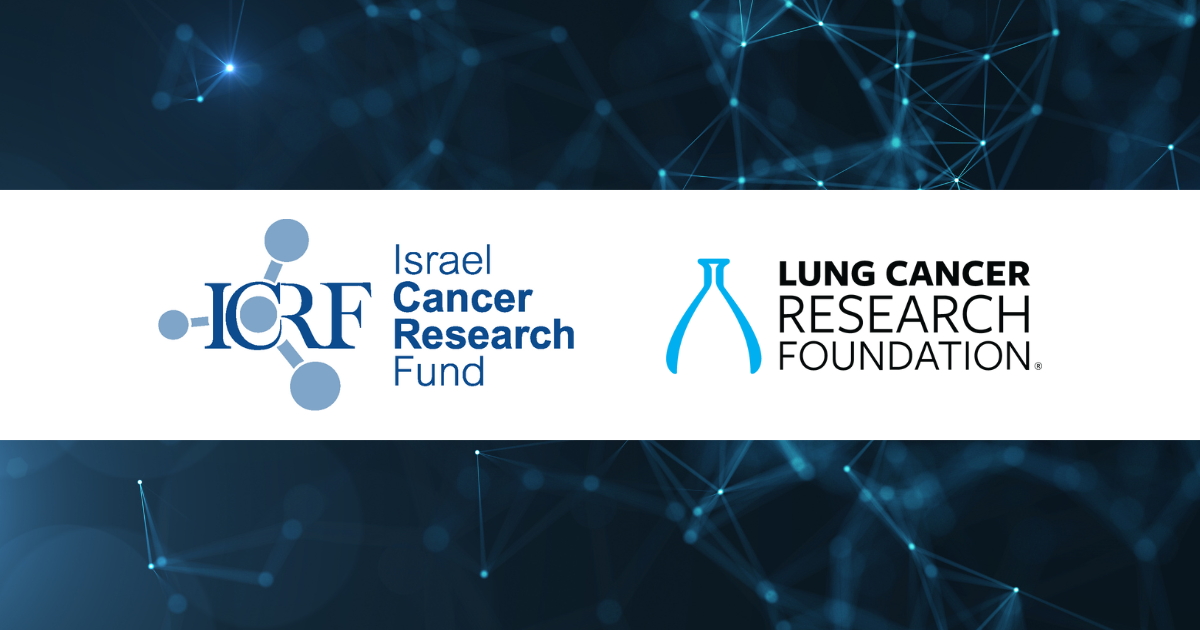Los grupos se asocian en un proyecto de investigación para probar un nuevo tratamiento innovador contra el cáncer con mutación KRAS que se está desarrollando en la Universidad Hebrea
NEW YORK, NY (febrero 18, 2025) – The Lung Cancer Research Foundation (LCRF) is pleased to announce its partnership with Israel Cancer Research Fund (ICRF) on a project led by Joel Yisraeli, PhD, and his lab in the Department of Developmental Biology and Cancer Research at the Hebrew University of Jerusalem. The ICRF-LCRF Project Grant is a three-year, $180,000 award.
The project, titled “Treating Lung and Colorectal Carcinomas by Targeting IGFBP1” will study the effects of an IGF2BP1 inhibitor discovered by Professor Yisraeli and his team, building upon previous ICRF-funded research.
IGF2BP1 es una proteína que se une al ARN y suele estar activa antes del nacimiento, pero vuelve a activarse en muchos tipos de cáncer. En los pacientes con adenocarcinoma de pulmón, los que tienen niveles elevados de IGF2BP1 y un gen KRAS mutado tienen una tasa de supervivencia mucho menor (15 meses) en comparación con los que no tienen niveles elevados de IGF2BP1 (88 meses). En ratones, cuando IGF2BP1 está activo junto con el gen mutante KRAS, ayuda a que los tumores crezcan en los pulmones y se extiendan a otras partes del cuerpo. Sin embargo, el bloqueo de IGF2BP1 puede impedir que estos tumores se extiendan.
El laboratorio del Prof. Yisraeli descubrió y perfeccionó una molécula llamada "AVJ16", que impide que IGF2BP1 se una a KRAS y a otros ARN promotores del cáncer. En modelos de ratón, este fármaco detiene el crecimiento de las células cancerosas cuando se inyecta bajo la piel. Este proyecto permitirá al Prof. Yisraeli y a su equipo probar el AVJ16 en un modelo genético de ratón de cáncer de pulmón, explorar su potencial como terapia adicional y desarrollar una pequeña molécula que se dirija a IGF2BP1 y lo degrade. Su objetivo final es crear un conjunto de nuevas y potentes terapias que inhiban específicamente IGF2BP1 e impidan el desarrollo del cáncer. Esperan que estos estudios con animales sean el primer paso hacia un ensayo clínico.
KRAS is the most common mutation in non-small cell lung cancer patients, making up about 25% of all lung cancers. The KRAS gene serves as a signaling pathway for cell growth, and when there is a mutation in the KRAS gene, it causes excess signaling, leading to excess cell growth and cancer. Roughly half of patients with KRAS-mutated lung cancer have a KRAS G12C mutation,1 for which there are targeted drug therapies following progression after first-line treatment. However, because these agents are not curative nor active in other KRAS mutations, additional research is urgently needed.
El profesor Yisraeli ha recibido subvenciones anteriores de la ICRF a lo largo de los años, incluso cuando creó inicialmente su laboratorio en la Facultad de Medicina de la Universidad Hebrea tras regresar de una beca posdoctoral en biología del desarrollo en Harvard. Este apoyo ha permitido nuevos descubrimientos y allanado el camino para su actual investigación sobre el cáncer de pulmón.
"El LCRF está encantado de asociarse con el ICRF en este proyecto de investigación", afirma el doctor Antoinette Wozniak, director científico del LCRF. "En un cáncer notoriamente difícil de tratar, este proyecto explora una nueva diana prometedora para el cáncer de pulmón con mutación de KRAS, lo que supone un avance emocionante".
Estoy agradecido por esta poderosa asociación entre la ICRF y la LCRF", afirma Arnold Baskies, MD, FACS, Presidente del Consejo de Administración de la ICRF. "Nuestra colaboración amplifica nuestra visión compartida de avanzar en el tratamiento del cáncer de pulmón al tiempo que aprovechamos las innovaciones de Israel en la lucha contra el cáncer".
To learn more about LCRF and its grants program, visit LCRF.org. To learn more about ICRF and its research program, visit icrfonline.org.
[1] KRAS and Lung Cancer, American Lung Association
###
About the Lung Cancer Research Foundation (LCRF)
The Lung Cancer Research Foundation® (LCRF) is the leading nonprofit organization focused on funding innovative, high-reward research with the potential to extend survival and improve quality of life for people with lung cancer. LCRF’s mission is to improve lung cancer outcomes by funding research for the prevention, diagnosis, treatment, and cure of lung cancer. To date, LCRF has funded 428 research grants, totaling nearly $48 million, the highest amount provided by a nonprofit organization dedicated to funding lung cancer research. For more information, visit LCRF.org.
Contact:
Sheila Sullivan
Sr. Director, Marketing & Communications, LCRF
ssullivan@lcrf.org
About Israel Cancer Research Fund (ICRF)
Israel Cancer Research Fund (ICRF) is the largest nongovernmental funder of cancer research in Israel. For 50 years, with nearly 3,000 grants totaling more than $98 million, ICRF has enabled the best and brightest scientists to conduct groundbreaking research for all types of cancer across Israel’s leading institutions. Our goal is to end the suffering caused by cancer and ensure that Israel remains a global leader in science and a beacon of hope for the world. The answer to cancer is research! Learn more at icrfonline.org.
Contact:
Gayle Peck
Director of Communications, ICRF
gayle.peck@icrfonline.org
About the Hebrew University of Jerusalem
This year marks 100 years of excellence in research, education, and innovation at the Hebrew University of Jerusalem, Israel’s premier institution of higher learning and research. The University is dedicated to advancing knowledge, fostering leadership, and promoting diversity, serving over 23,000 students from over 80 countries. As home to founder Albert Einstein’s archives, the University produces nearly 40% of Israel’s civilian scientific research and has received over 11,000 patents. Faculty and alumni of the Hebrew University have won eight Nobel Prizes and a Fields Medal, and continue to shape the future. For more information about Hebrew University’s academic programs, research, and achievements, please visit http://new.huji.ac.il/en.
Contact:
Danae Marks-Callaf
Director of International Communications
danaemc@savion.huji.ac.il
